Monthly Archives: December 2023
 It’s a sad thing when someone dies with no next of kin…no friends or loved ones to see to funeral arrangements, last wishes, or even, to attend the funeral. I suppose for the most part, the unfortunate departed one would probably be cremated and no funeral would be held…at least in most places that would be the case. That seems even more sad than someone who lived their last days alone, with no friends and no family. It’s almost like being thrown away.
It’s a sad thing when someone dies with no next of kin…no friends or loved ones to see to funeral arrangements, last wishes, or even, to attend the funeral. I suppose for the most part, the unfortunate departed one would probably be cremated and no funeral would be held…at least in most places that would be the case. That seems even more sad than someone who lived their last days alone, with no friends and no family. It’s almost like being thrown away.
In Amsterdam, however, they just can’t stand the thought of such a sad end to such a sad life. So, they began a tradition. In a heart-warming tribute to those lost souls who pass without any next of kin or friends, a poet will write a poem and even recite it at the funeral. What an incredible act of kindness and compassion!! These poets are not paid for their services, and yet they take to time to write a poem specifically for the newly departed person, even though the poet never knew the departed.
poem and even recite it at the funeral. What an incredible act of kindness and compassion!! These poets are not paid for their services, and yet they take to time to write a poem specifically for the newly departed person, even though the poet never knew the departed.
Frank Starik leads a group of poets in Amsterdam. These poets attend the funerals of the city’s “unmourned” dead, remembering them with a specially composed poem. “I want to give them back a life, a history” he told Reuters reporter Alexandra Hudson. The social services in Amsterdam bury around 250 people a year, and about 15 of those depart with no trace of relatives or friends. For most of us that seems unheard of and shocking, but I suppose that these people are often buried or cremated with little fanfare, so we rarely hear anything about them, but these are the cases closely watched by the poet group, so they can step in and give their own tribute and a labor of compassion and love for a person who had no one to love them. While the poets write their poems, the city contributes by providing a coffin, bouquet of flowers, and even plays music 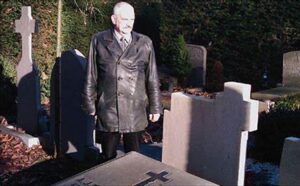 best guessed to be the deceased’s choice of music. I’m not sure how they know what music to use, but maybe they look at the things in the deceased’s home, or anything else like name the wearing of a cross. I love these acts of kindness, and what social worker told Reuters when he said, “Everyone in Amsterdam – rich or poor – should have a dignified funeral, with flowers, with coffee and some thoughts about their life. We are not responsible for how they lived, but we are responsible for them in death, and if they died in Amsterdam then they are one of us.” I can’t think of an act of kindness that is more touching than this. Well done, Amsterdam. Well done.
best guessed to be the deceased’s choice of music. I’m not sure how they know what music to use, but maybe they look at the things in the deceased’s home, or anything else like name the wearing of a cross. I love these acts of kindness, and what social worker told Reuters when he said, “Everyone in Amsterdam – rich or poor – should have a dignified funeral, with flowers, with coffee and some thoughts about their life. We are not responsible for how they lived, but we are responsible for them in death, and if they died in Amsterdam then they are one of us.” I can’t think of an act of kindness that is more touching than this. Well done, Amsterdam. Well done.
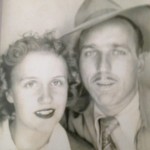
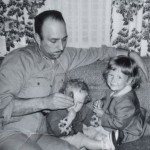 Somehow, this year, this day sneaked up on me. I knew what day my dad, Allen Spencer passed away, and I knew it was coming up, but then…suddenly, yesterday as I was working on my computer, I realized that it was tomorrow, and it hit me like a kick in the gut. I hate that. I prefer to be prepared for the coming of this day and other days like this, so I can steel my emotions to it. It seems impossible that my dad has been in Heaven for 16 years now. There are great grandchildren and great great grandchildren that he never got to meet. There are so many new additions by marriage that he did get to meet…and more than that, they didn’t get to meet him. That is sad indeed, because my dad loved playing with the little kids…hearing their laughter was his delight. He would have loved all of the new spouses too. We have been very blessed with all of them.
Somehow, this year, this day sneaked up on me. I knew what day my dad, Allen Spencer passed away, and I knew it was coming up, but then…suddenly, yesterday as I was working on my computer, I realized that it was tomorrow, and it hit me like a kick in the gut. I hate that. I prefer to be prepared for the coming of this day and other days like this, so I can steel my emotions to it. It seems impossible that my dad has been in Heaven for 16 years now. There are great grandchildren and great great grandchildren that he never got to meet. There are so many new additions by marriage that he did get to meet…and more than that, they didn’t get to meet him. That is sad indeed, because my dad loved playing with the little kids…hearing their laughter was his delight. He would have loved all of the new spouses too. We have been very blessed with all of them.
My dad and my mom, Collene Spencer gave us all such a beautiful life. They built in us a deep faith in God and a deep sense of family. They are both in Heaven now, but in our memories live the echos of those beautiful moments. Dad always loved to travel, and that started many family vacations. Sometimes, my parents were 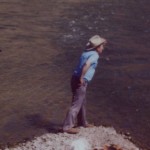
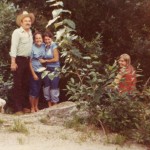 happy to plan a long vacation, and sometimes, they would just load up the car and go where the road would take us. I suppose people might think that was a weird way to travel, but those were some of the most amazing trips ever. My sisters and I can say that we have visited almost every state in the nation. We took a trip every summer…even in the lean years. I will never forget the “Wyoming Tour” when we took several legs and traveled to each of the four sections of the state. Sometimes, like that year, a tour of our home state was just what we needed, and it was very relaxing and fun.
happy to plan a long vacation, and sometimes, they would just load up the car and go where the road would take us. I suppose people might think that was a weird way to travel, but those were some of the most amazing trips ever. My sisters and I can say that we have visited almost every state in the nation. We took a trip every summer…even in the lean years. I will never forget the “Wyoming Tour” when we took several legs and traveled to each of the four sections of the state. Sometimes, like that year, a tour of our home state was just what we needed, and it was very relaxing and fun.
My dad was a gentle man, as well as a gentleman. I truly think that it was harder on him to discipline is that it was on us. Dad would do his best to try to work things out without the spanking we most likely deserved. I remember so many times that Dad kept the peace in our family. We were never allowed to “let the sun go down on our wrath.” Dad knew that it was essential to say you’re sorry and make up with your loved ones. He family struggled with that, and it caused splits in the family…with everyone but my dad. He got along with all of his 
 siblings. He refused to let it be otherwise. Dad believed in being the peacemaker. And he always was. That was probably one of the greatest and most important lessons ever. I wish my dad was still with us. I miss his teachings, his personality, his gentleness, and his kindness, not to mention his silliness, and he was able to be quite silly. I really miss that too. Today, marks 16 long years without seeing my dad. It is a kick in the gut, and I can’t wait to see him again when I go to Heaven. We love and miss you every day, Dad. Tell Mom we love and miss her too. Hugs to you both.
siblings. He refused to let it be otherwise. Dad believed in being the peacemaker. And he always was. That was probably one of the greatest and most important lessons ever. I wish my dad was still with us. I miss his teachings, his personality, his gentleness, and his kindness, not to mention his silliness, and he was able to be quite silly. I really miss that too. Today, marks 16 long years without seeing my dad. It is a kick in the gut, and I can’t wait to see him again when I go to Heaven. We love and miss you every day, Dad. Tell Mom we love and miss her too. Hugs to you both.

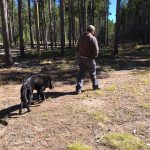 My nephew, Barry Schulenberg has always been a hardworking man. Even as a young boy, all he ever wanted was to be a mechanic, just like his grandpa, my father-in-law, Walt Schulenberg. Barry was always very much like his grandpa. They were like twins…at least in their hopes and aspirations. Over the years, those hopes and dreams never changed. Of course, my father-in-law was a mechanic all along, but Barry wasn’t. He was a little boy who just wanted to quit school and go to work with his grandpa. We all thought it was such a cute thing that Barry loved his grandpa so much and wanted to be just like him.
My nephew, Barry Schulenberg has always been a hardworking man. Even as a young boy, all he ever wanted was to be a mechanic, just like his grandpa, my father-in-law, Walt Schulenberg. Barry was always very much like his grandpa. They were like twins…at least in their hopes and aspirations. Over the years, those hopes and dreams never changed. Of course, my father-in-law was a mechanic all along, but Barry wasn’t. He was a little boy who just wanted to quit school and go to work with his grandpa. We all thought it was such a cute thing that Barry loved his grandpa so much and wanted to be just like him.
Barry is grown up now, and he fulfilled that lifelong dream of being a mechanic. He has been working for the State of Wyoming for years now, and he loved his job very much. Recently, when his supervisor announced his decision to retire, Barry was offered the position of supervisor. Of course, he accepted and after some training, 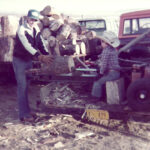
 he is now the shop supervisor. It is quite a change for Barry, but it’s one that was really the logical next step for him. I don’t know how much mechanics work he does these days, but he is at least in an advisory position for the work that is being done in the shop. It is a big responsibility, because he is responsible for making sure the highways are open and maintained…at least opened, as much as possible in Wyoming’s winters. He would also be responsible for making the decision to close, I suppose. It’s all a big change from being elbow deep in the engine of a truck, to being elbow deep in paperwork, but Barry is a smart man, and he can handle either one.
he is now the shop supervisor. It is quite a change for Barry, but it’s one that was really the logical next step for him. I don’t know how much mechanics work he does these days, but he is at least in an advisory position for the work that is being done in the shop. It is a big responsibility, because he is responsible for making sure the highways are open and maintained…at least opened, as much as possible in Wyoming’s winters. He would also be responsible for making the decision to close, I suppose. It’s all a big change from being elbow deep in the engine of a truck, to being elbow deep in paperwork, but Barry is a smart man, and he can handle either one.
When he’s not working, Barry and his wife, Kelli loved to go bicycling, hiking, skiing, and camping. They love the outdoors, and would happily spend all their free time outside, if the weather permitted. of course, most of 
 the outdoor activity they enjoy works far better in the summertime, so the warmer months are probably the ones they favor. They also love to travel and go to concerts. They have attended many over the nearly twenty years they have been married. Barry and Kellie have a sweet dog named Scout. He is their second dog together. Their first dog, Dakota died before they got Scout. Scout helped with the grieving process, and now, Scout is just their baby. They are all a happy family. Today is Barry’s birthday. Happy birthday Barry!! Have a great day!! We love you!!
the outdoor activity they enjoy works far better in the summertime, so the warmer months are probably the ones they favor. They also love to travel and go to concerts. They have attended many over the nearly twenty years they have been married. Barry and Kellie have a sweet dog named Scout. He is their second dog together. Their first dog, Dakota died before they got Scout. Scout helped with the grieving process, and now, Scout is just their baby. They are all a happy family. Today is Barry’s birthday. Happy birthday Barry!! Have a great day!! We love you!!
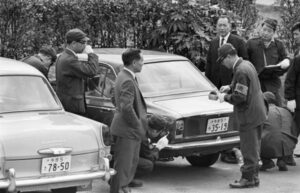 On December 10, 1968, the 300-million-yen robbery, also known as the 300-million-yen affair or incident, took place in Tokyo, Japan, when a man posing as a police officer on a motorcycle performed a “traffic stop” of some bank employees transferring money and stole about 294 million yen. This as half-century old unsolved heist remains the single largest heist in Japanese history. On that fateful day, four Kokubunji branch employees of the Nihon Shintaku Ginko (Nippon Trust Bank) were transporting 294,307,500 yen (about US$817,520 at 1968 exchange rates) in the trunk of a Nissan Cedric company car. It seems like a rather odd and very unsecure way to transfer such a large sum of money, but apparently, they saw no danger…a mistake they would most certainly regret. The money, contained in metal boxes was to be for bonuses for the employees of Toshiba’s Fuchu factory.
On December 10, 1968, the 300-million-yen robbery, also known as the 300-million-yen affair or incident, took place in Tokyo, Japan, when a man posing as a police officer on a motorcycle performed a “traffic stop” of some bank employees transferring money and stole about 294 million yen. This as half-century old unsolved heist remains the single largest heist in Japanese history. On that fateful day, four Kokubunji branch employees of the Nihon Shintaku Ginko (Nippon Trust Bank) were transporting 294,307,500 yen (about US$817,520 at 1968 exchange rates) in the trunk of a Nissan Cedric company car. It seems like a rather odd and very unsecure way to transfer such a large sum of money, but apparently, they saw no danger…a mistake they would most certainly regret. The money, contained in metal boxes was to be for bonuses for the employees of Toshiba’s Fuchu factory.
As the car proceeded along its route to the home of the bank manager for delivery to the factory, a young man in the uniform of a motorcycle police officer blocked the path of the car. Like most of us would do, when faced with an authority figure telling us to stop, the men in the car obeyed the “officer” and a mere 200 meters from its destination, on a street next to Tokyo Fuchu Prison they stopped. The impersonator informed the bank employees that their bank branch manager’s house had been destroyed by an explosion, and a warning had been received that a bomb had also been planted in the car. The four employees quickly exited the vehicle, while the police officer crawled under the car. Moments later, the “officer” he rolled out, shouting that the car was about to explode and telling the employees to run. Smoke and flames appeared underneath the car. The employees quickly retreated, and “police officer” got into it and drove away. I’m sure it took several moments for the employees to figure out that there was no bomb, and the “officer” wasn’t a selfless hero trying to get the car away from any innocent bystanders…especially when there was no explosion, and the “officer” didn’t come back. They were now faced with a new and unpleasant dilemma…telling their boss they had been duped.
The “police officer” had worked out his story well, telling the bank employees he knew about the bomb because 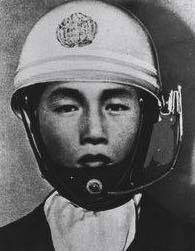 threatening letters had been sent to the bank manager beforehand. He was also prepared with a warning flare to create the smoke and flames he had ignited while under the car. At some point, the thief abandoned the bank’s car and transferred the metal boxes to another car, which he had stolen beforehand. Then, he also abandoned that car and transferred the boxes into to another previously stolen vehicle. He had laid out his plan very well, but there were, nevertheless, 120 pieces of evidence left at the scene of the crime, including the “police” motorcycle, which had been painted white. Unfortunately, the evidence was mostly common everyday items. It is believed that he scattered them around on purpose to confuse the police investigation…a planned which seems to have worked quite well too.
threatening letters had been sent to the bank manager beforehand. He was also prepared with a warning flare to create the smoke and flames he had ignited while under the car. At some point, the thief abandoned the bank’s car and transferred the metal boxes to another car, which he had stolen beforehand. Then, he also abandoned that car and transferred the boxes into to another previously stolen vehicle. He had laid out his plan very well, but there were, nevertheless, 120 pieces of evidence left at the scene of the crime, including the “police” motorcycle, which had been painted white. Unfortunately, the evidence was mostly common everyday items. It is believed that he scattered them around on purpose to confuse the police investigation…a planned which seems to have worked quite well too.
One suspect was the 19-year-old son of a police officer. That young man died of potassium cyanide poisoning on December 15, 1968. He had no alibi, which may not have meant anything, since the money was not found at the time of his death. His death was deemed a suicide, and he was considered not guilty, according to official record. There was simply no evidence to tie him to the crime. Another, arrest made on December 12, 1969, of a 26-year-old man, who was suspected by the Mainichi Shimbun, proved to be a dead end too, when his alibi checked out. The arrest was initially made on an unrelated charge, but on the day of the robbery, he was taking a proctored examination. The only resulting charge from that arrest was that of “abuse of power” as the arrest was made based on false pretenses.
The police launched a massive investigation, posting 780,000 composite pictures throughout Japan. Amazingly, the list of suspects (or as it really must have been, persons of interest) included 110,000 names. These had to have been people the police thought might possibly be able to carry off such a heist, because it would really be impossible to have that many real suspects. Approximately 170,000 policemen participated in the investigation, which was the largest investigation in Japanese history…or so the story goes. They gathered and examined fingerprints from the scene and comparison of them to those on file. In the end, six million fingerprints on file were compared individually, however not a single match was found.
On November 15, 1975, just before the statute of limitations for that crime was over, a friend of the 19-year-old suspect was arrested on an unrelated charge. He had a large amount of money and was suspected of the 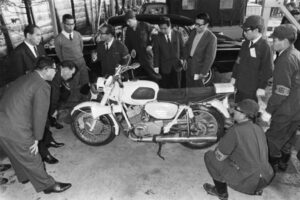 robbery. He was 18 years old when the robbery occurred. The police asked him for an explanation for the large amount of money, but he refused to speak, and they were not able to prove that his money had come from the robbery. In December 1975, after a seven-year investigation, police announced that the statute of limitations on the crime had passed, and that the investigation was at an end. In a further slap to justice, as of 1988, the thief has also been relieved of any civil liabilities, which means that he can tell his story without fear of legal repercussions. Still, no one has ever stepped forward to “tell said story” either, which tends to further exasperate the authorities, because it is the unsolved crimes that torment a police officer the most.
robbery. He was 18 years old when the robbery occurred. The police asked him for an explanation for the large amount of money, but he refused to speak, and they were not able to prove that his money had come from the robbery. In December 1975, after a seven-year investigation, police announced that the statute of limitations on the crime had passed, and that the investigation was at an end. In a further slap to justice, as of 1988, the thief has also been relieved of any civil liabilities, which means that he can tell his story without fear of legal repercussions. Still, no one has ever stepped forward to “tell said story” either, which tends to further exasperate the authorities, because it is the unsolved crimes that torment a police officer the most.

 I was born on the tip of Lake Superior, in a little town called…you guessed it, Superior in Wisconsin. While my family moved to Casper, Wyoming when I was three years old, we have been back to Superior many times, and I still consider Superior, Wisconsin my hometown. It’s like the lake and that whole area is a part of my DNA. I love our visits back there, and so many of my cousins still live there, so there will always be ties to the area. I’ve read books about the many ships that have been victim to the storms and the rocky shores in some areas, and I love to look at pictures that some awesome people post on Facebook. I know about the name that was given by the Native Americans…Gitche Gumee, which means “Big Sea” or “Huge Water” just about always refers to Lake Superior. I know about the November Gales that hit Lake Superior every November, that can easily take down an unsuspecting ship that ventured out too late in the year.
I was born on the tip of Lake Superior, in a little town called…you guessed it, Superior in Wisconsin. While my family moved to Casper, Wyoming when I was three years old, we have been back to Superior many times, and I still consider Superior, Wisconsin my hometown. It’s like the lake and that whole area is a part of my DNA. I love our visits back there, and so many of my cousins still live there, so there will always be ties to the area. I’ve read books about the many ships that have been victim to the storms and the rocky shores in some areas, and I love to look at pictures that some awesome people post on Facebook. I know about the name that was given by the Native Americans…Gitche Gumee, which means “Big Sea” or “Huge Water” just about always refers to Lake Superior. I know about the November Gales that hit Lake Superior every November, that can easily take down an unsuspecting ship that ventured out too late in the year.
Some say Lake Superior is the largest of the Great Lakes. Some say it is actually an inland sea. It is the world’s largest freshwater lake. In fact, Lake Superior is in a class by itself…and that makes it a national treasure. Its character is very unique. It looks and feels like an ocean. If you have ever seen it, your first thought is that you can’t see to the other side…like an ocean. The Lake accommodates the big ships…big ore ships, big grain haulers, the really huge ships. When you watch them come into the port, you find yourself amazed that you could be standing there beside them. Their very entrance into the port is a daily tourist attraction…and the locals love it too. Some people say that “A day on Lake Superior leaves you exhilarated, connected, restored. The Lake’s energy courses through your bones right to your soul. What a gift.” Yes, Lake Superior is most definitely a gift to be sure.
Some scientists say that Lake Superior is truly an inland sea…even if it is fresh water and not salt water. The maritime agencies take weather, navigation and buoyage very seriously, and they monitor them carefully. People are not encouraged to venture out on Lake Superior until they have met the bottom-line amount of knowledge necessary to initiate a healthy relationship with the lake. That bottom-line amount of knowledge includes paying attention to equipment, your level of training, and definitely the surrounding environment. 
 These are all important things that are recommended before a person ventures out onto any ocean or sea, which sort of classifies Lake Superior as an inland sea too. I suppose each person will have their own opinion on this, but since I have spent some time there, I tend to think that while it will always be Lake Superior to me, it will also be what I must agree, an inland sea.
These are all important things that are recommended before a person ventures out onto any ocean or sea, which sort of classifies Lake Superior as an inland sea too. I suppose each person will have their own opinion on this, but since I have spent some time there, I tend to think that while it will always be Lake Superior to me, it will also be what I must agree, an inland sea.

 Since my niece, Jessi Sawdon and her husband, Jason moved from Casper, Wyoming to Cheyenne, Wyoming, those of us still in Casper don’t get to see as much of them. Of course, her parents and siblings go down to see them often, and they come to Casper as often as they can. Jessi’s sister, Lindsay Moore and her husband Shannon live in Laramie, Wyoming, which is only 40 minutes away, so Jessi and Lindsay and their families get together a lot. The sisters love their sister time, and their daughters, Adelaide Sawdon and Mackenzie Moore are very close too. Living so nearby each other is a great blessing for the girls and their families.
Since my niece, Jessi Sawdon and her husband, Jason moved from Casper, Wyoming to Cheyenne, Wyoming, those of us still in Casper don’t get to see as much of them. Of course, her parents and siblings go down to see them often, and they come to Casper as often as they can. Jessi’s sister, Lindsay Moore and her husband Shannon live in Laramie, Wyoming, which is only 40 minutes away, so Jessi and Lindsay and their families get together a lot. The sisters love their sister time, and their daughters, Adelaide Sawdon and Mackenzie Moore are very close too. Living so nearby each other is a great blessing for the girls and their families.
Because they live so close to each other, Jessi and Lindsay get together frequently, and they have a lot of fun. They love to go hiking in the nice weather, and they have had the opportunity to go several times this year. Their favorite hiking spots are around Vedauwoo and near the Lincoln Memorial. The whole family loves to go 
 camping. One of their favorite spots is in the Big Horn Mountains, and they got to go there again this year. The times when they go camping are so special, because they get to disconnect from the world and just enjoy the connection with family. They whole family also went 4 wheeling and went down to Tensleep for the 4th of July parade. It was such a peaceful time. They just laid around Meadowlark Lake in the sun and relaxed. They also went camping at Guernsey over Mother’s Day. While they were camping at Guernsey, Jessi picked their dog, Riley up and had him on her lap. Jason made a funny exasperated, but tolerant look on his face! The picture made Jessi’s mom, Allyn Hadlock laugh, and Jessi though it was very funny too!! Jason always makes just the right faces!!
camping. One of their favorite spots is in the Big Horn Mountains, and they got to go there again this year. The times when they go camping are so special, because they get to disconnect from the world and just enjoy the connection with family. They whole family also went 4 wheeling and went down to Tensleep for the 4th of July parade. It was such a peaceful time. They just laid around Meadowlark Lake in the sun and relaxed. They also went camping at Guernsey over Mother’s Day. While they were camping at Guernsey, Jessi picked their dog, Riley up and had him on her lap. Jason made a funny exasperated, but tolerant look on his face! The picture made Jessi’s mom, Allyn Hadlock laugh, and Jessi though it was very funny too!! Jason always makes just the right faces!!
This family loves a good laugh and loves saying things that will make everyone laugh. In fact, when I asked the girls about some story ideas for Jessi, Lindsay said, “Who is Jessi???” And Jessi’s sister-in-law, Chelsea said, “She smells and hates purple!!” I don’t know about the purple, but of course the rest was just joking. Sisters, hahahaha!!! It’s 
 typical sister time fun for these girls. When you are around them, you can’t help but laugh too. I think laughter is the best medicine, and Jessi laughs often. She also works hard. She has been employed by Lum Studio since she graduated from college, and they love her there, as do all of their clients. Someone like Jessi is such an asset to any business, and they are truly blessed to have her there. Today is Jessi’s birthday. Happy birthday Jessi!! Have a great day!! We love you very much!!
typical sister time fun for these girls. When you are around them, you can’t help but laugh too. I think laughter is the best medicine, and Jessi laughs often. She also works hard. She has been employed by Lum Studio since she graduated from college, and they love her there, as do all of their clients. Someone like Jessi is such an asset to any business, and they are truly blessed to have her there. Today is Jessi’s birthday. Happy birthday Jessi!! Have a great day!! We love you very much!!

 There are some national events that stay in our thoughts and hearts forever. The Pearl Harbor is one of those events. The attack on Pearl Harbor was so destructive and so unexpected that it shocked everyone…well, most everyone anyway. President Franklin D Roosevelt knew that Japan would likely attack, but thought it would be in the western Pacific Ocean, especially the Philippians. Pearl Harbor was considered an unlikely target. Roosevelt wanted to enter the war, but he wanted to attack Germany, whom he considered to be the bigger threat. In fact, he had ordered the attack on any U-Boats found in the west side of the Atlantic. So, technically the US was already in the war…most people just didn’t know that. Still, the attack on Pearl Harbor was horrific and the United States had to retaliate.
There are some national events that stay in our thoughts and hearts forever. The Pearl Harbor is one of those events. The attack on Pearl Harbor was so destructive and so unexpected that it shocked everyone…well, most everyone anyway. President Franklin D Roosevelt knew that Japan would likely attack, but thought it would be in the western Pacific Ocean, especially the Philippians. Pearl Harbor was considered an unlikely target. Roosevelt wanted to enter the war, but he wanted to attack Germany, whom he considered to be the bigger threat. In fact, he had ordered the attack on any U-Boats found in the west side of the Atlantic. So, technically the US was already in the war…most people just didn’t know that. Still, the attack on Pearl Harbor was horrific and the United States had to retaliate.
The attack on Pearl Harbor took so many people by surprise. It was a Sunday morning, and many of the military personnel were off base attending church services. The Japanese knew that the ships, planes, and the base in general would be seriously understaffed at the time of the attack. Of course, on the flip side, the fact that so many of the military personnel were away from the base at the time of the attack, meant that the base was able to get back up and running quickly and when we did enter the war, the Japanese were surprised about the attacks coming back at them. Of course, as we all know, the Allies went on to win the war against the Axis nation, including Germany and Japan. It’s been said that people shouldn’t wake the sleeping giant, and that is a wise statement. The Japanese awakened the United States to the fact that appeasing your enemies will not prevent an attack. It takes a show of military might to inform our enemies that it is wise to back away and let the sleeping giants lie.
Of course, the victory that was won following the attack of Pearl Harbor and the US entrance into World War II, came at a high price. A total of 2,403 people (both civilians and soldiers), not to mention ships, airplanes, and 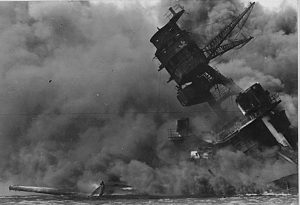
 other military equipment. After the attack, the people of the United States were…angry!! We quickly geared up and the war was on for the United States. Our delay could never bring back the people we lost, but we would certainly avenge their loss. Today we remember those we lost, and those who went out to take up the fight to protect our country from such a horrendous attack.
other military equipment. After the attack, the people of the United States were…angry!! We quickly geared up and the war was on for the United States. Our delay could never bring back the people we lost, but we would certainly avenge their loss. Today we remember those we lost, and those who went out to take up the fight to protect our country from such a horrendous attack.
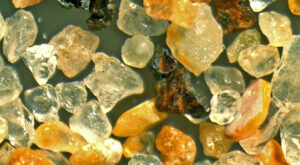 I had never heard the expression, “war sand” before, but when I think about it, the presence of it makes perfect sense. It would be impossible to have any kind of a battle and not leave behind spent bullets, as well as bits of shrapnel from bombs littering the battlefield. In the case of the D-Day Battle, there were more that 5,000 tons of bombs that littered the beaches of Normandy. The beaches were literal chaos, and it was all they could do to rescue the wounded, recover the bodies, and remove the equipment, much less save bits of metal and spent bullets left behind. On D-Day, more than 5,000 tons of bombs were dropped by the Allies on the Axis powers as part of the prelude to the Normandy landings…and then there was the bullets and such that hit the beaches during the battle.
I had never heard the expression, “war sand” before, but when I think about it, the presence of it makes perfect sense. It would be impossible to have any kind of a battle and not leave behind spent bullets, as well as bits of shrapnel from bombs littering the battlefield. In the case of the D-Day Battle, there were more that 5,000 tons of bombs that littered the beaches of Normandy. The beaches were literal chaos, and it was all they could do to rescue the wounded, recover the bodies, and remove the equipment, much less save bits of metal and spent bullets left behind. On D-Day, more than 5,000 tons of bombs were dropped by the Allies on the Axis powers as part of the prelude to the Normandy landings…and then there was the bullets and such that hit the beaches during the battle.
These days, scientists estimate that 4% of the Normandy beaches are made up of shrapnel from the D-Day Landings. They have studied the sand on the beaches of Normandy, and they’ve found microscopic bits of smoothed-down shrapnel from the landings. The sand on the Normandy beaches is known as “war sand,” which is defined as “sand that is a result from wartime operations.” I had heard of beaches that are made of glass that has been rubbed smooth by the water against the ground, but I hadn’t ever thought about the water being able to smooth the sharp bits of shrapnel to make them smooth. Nevertheless, the beaches of Normandy are  covered in a fine dust created from particles deposited there during or right before the D-Day operations of World War II. The grains are hidden among the beaches of the Normandy. It makes me wonder how many other beaches have shrapnel and bullets as a secret part of their makeup.
covered in a fine dust created from particles deposited there during or right before the D-Day operations of World War II. The grains are hidden among the beaches of the Normandy. It makes me wonder how many other beaches have shrapnel and bullets as a secret part of their makeup.
Earle McBride, a geologist from the University of Texas at Austin, figures the sands shrapnel level at 4%. That doesn’t seem like much, but considering the years since D-Day, and the number of people who have walked those beaches, possibly looking for closure concerning lost loved ones, 4% is quite a bit. One might wonder how he could have come to that conclusion, but apparently the sand-sized fragments of steel are magnetic, making them easily discernible under a microscope. Of course, there are still relics from the battle. The artificial landscape of eroded machinery is still detectable using special instruments in the coastal dunes.
The shrapnel content of the beaches will eventually disappear. It is estimated that at the present rate of deterioration, the magnetic particles will probably be wiped from the sands in another 100 years. The shrapnel is subject to waves, storms, and rust, which will wipe these spherical magnetic shards from the coasts.  Strangely, Earle McBride didn’t set out to find these shards, but a visit to Omaha Beach in 1988 resulted in the discovery of these tiny remnants of shrapnel. I wonder how he noticed the shrapnel. Oddly, the shards were collected 20 years ago and only analyzed recently. Why did it take so long to examine them? Of course, I have answered my own question. While he may have known what he had, it is possible that he really didn’t or at least didn’t know the significance of what he had. He might have simply collected the sand as a keepsake of his visit. Nevertheless, upon examination, the samples revealed that the jagged-edged grains had a metallic sheen and a rust-colored coating. The angular grains proved to be magnetic…they proved to be shrapnel from that long ago battle.
Strangely, Earle McBride didn’t set out to find these shards, but a visit to Omaha Beach in 1988 resulted in the discovery of these tiny remnants of shrapnel. I wonder how he noticed the shrapnel. Oddly, the shards were collected 20 years ago and only analyzed recently. Why did it take so long to examine them? Of course, I have answered my own question. While he may have known what he had, it is possible that he really didn’t or at least didn’t know the significance of what he had. He might have simply collected the sand as a keepsake of his visit. Nevertheless, upon examination, the samples revealed that the jagged-edged grains had a metallic sheen and a rust-colored coating. The angular grains proved to be magnetic…they proved to be shrapnel from that long ago battle.
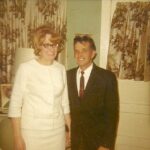
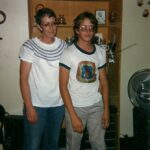 Seven long years have come and gone since Aunt Linda Cole went home to be with the Lord. It seems impossible that Linda has been gone that long, and yet time seems to have flown by too. For many years my husband, Bob Schulenberg and I took our girls, Corrie Petersen and Amy Royce to go visit his Aunt Linda and his uncle, Bobby Cole, and their children, Sheila and Pat. It was an annual fun trip, and our family had a great time. Linda and Bobby lived in Kennebec, South Dakota in those days, and if you don’t know the area, well, Kennebec was that town they meant when they said, “If you’re driving along and you blink, you will miss it.” The population in those days was about 334 in 1980. It was about 281 in 2020. That means that there was little to do there, except visit with family and play cards, which we did a lot of. That also meant that the kids could all run about pretty freely, because there wasn’t much way to get into trouble either…other than fighting with their cousins that is.
Seven long years have come and gone since Aunt Linda Cole went home to be with the Lord. It seems impossible that Linda has been gone that long, and yet time seems to have flown by too. For many years my husband, Bob Schulenberg and I took our girls, Corrie Petersen and Amy Royce to go visit his Aunt Linda and his uncle, Bobby Cole, and their children, Sheila and Pat. It was an annual fun trip, and our family had a great time. Linda and Bobby lived in Kennebec, South Dakota in those days, and if you don’t know the area, well, Kennebec was that town they meant when they said, “If you’re driving along and you blink, you will miss it.” The population in those days was about 334 in 1980. It was about 281 in 2020. That means that there was little to do there, except visit with family and play cards, which we did a lot of. That also meant that the kids could all run about pretty freely, because there wasn’t much way to get into trouble either…other than fighting with their cousins that is.
Linda and Bobby were fun-loving people, who laughed and joked often. We always felt welcome in their home. I’m sure that is why our visits were pretty much an annual event. We wanted our girls to know their family, and since the family wasn’t all located in one state, we took the opportunity to travel to other places for visits…something I have been thankful to have done, now that so many of the family members have left us now. You just never know how long people are going to be around, so taking the time out of our busy lives to make a few connection is so vital…especially when those we are going to connect with live in the same town.
Linda and Bobby particularly loved square dancing. What seems to most of us, like a long-lost dance style, came alive to them. Maybe it was one of the only things to do in rural South Dakota, or maybe, when the opportunity presented itself, Linda and Bobby got excited about the prospect of doing something weekly that had only previously been taught to them in the classrooms of their grade schools. That is where I learned what little I recall about square dancing anyway. I was never really interested in square dancing, so it’s quite likely 
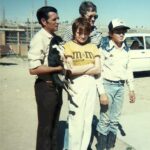 that I didn’t really pay attention to the instruction I was given. I was a child of the rock and roll era, and so square dancing seemed very much like “old fuddy duddy” stuff to me and my generation. Linda and Bobby were of the generation prior, and maybe square dancing was still somewhat in style them…or maybe it was just what was available to them for the whole “evening out with friends” routine. Whatever the case may be, they loved it and they were quite good at it. Today would have been Linda’s 77th birthday. Happy birthday in Heaven, Linda. We love and miss you very much.
that I didn’t really pay attention to the instruction I was given. I was a child of the rock and roll era, and so square dancing seemed very much like “old fuddy duddy” stuff to me and my generation. Linda and Bobby were of the generation prior, and maybe square dancing was still somewhat in style them…or maybe it was just what was available to them for the whole “evening out with friends” routine. Whatever the case may be, they loved it and they were quite good at it. Today would have been Linda’s 77th birthday. Happy birthday in Heaven, Linda. We love and miss you very much.
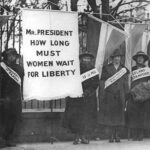
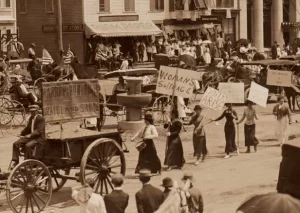 For many years, in the United States, women were not allowed to vote. Of course, many women didn’t have much of a formal education either. They might have gone to the sixth grade or something, but then it was thought that they should be at home with their mothers, learning to run a household, cook, and raise children. It was thought that political matters should be left to the men, “who understood these things.” I don’t believe that the men were being intentionally chauvinistic, but it was simply the way things were in that day and age.
For many years, in the United States, women were not allowed to vote. Of course, many women didn’t have much of a formal education either. They might have gone to the sixth grade or something, but then it was thought that they should be at home with their mothers, learning to run a household, cook, and raise children. It was thought that political matters should be left to the men, “who understood these things.” I don’t believe that the men were being intentionally chauvinistic, but it was simply the way things were in that day and age.
Lydia Taft became the first legal woman voter in colonial America in 1756. Under British rule in the Massachusetts Colony, in the New England town meeting in Uxbridge, Massachusetts, Taft voted on at least three occasions. The British law at the time stated that “unmarried white women who owned property could vote in New Jersey.” The law was in place from 1776 to 1807. After 1807, things pretty much went back to the “only men can possibly understand politics, sweetie” mentality, and women couldn’t vote until 1869, when Wyoming granted women the right to vote. Utah followed in 1870. Prior to the 19th Amendment, individual states made their own decisions on women’s suffrage, according to Time magazine. In fact, most states allowed women to vote in at least some elections prior to 1920, with only eight of 48 states completely disenfranchising women. Still, even when they weren’t allowed to vote, nothing prohibited women from running for office in many cases…and they often did. Thousands of women ran for office prior to 1920 and many of them won and served long before they were legally allowed to vote. 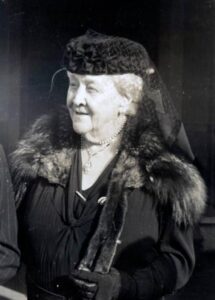
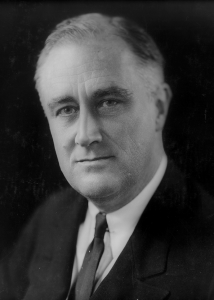
As far as presidents go, it hit me that while many wives, mothers, sisters, and daughters had a husband, son, brother, or father who was president, the first 31 of those presidents were elected without the votes of the women in their families. In fact, Franklin D Roosevelt’s mother was the first mom who got to cast a vote for her son as president. How strange that must have felt. I’m sure that anyone who finds themselves related to the President of the United States, might find life a little bit surreal, but that first ability to vote for that family member…wow!! Of course, the whole idea of being able to legally vote after fighting for the privilege so hard must have been surreal in itself…whether you know the candidate personally or not.

